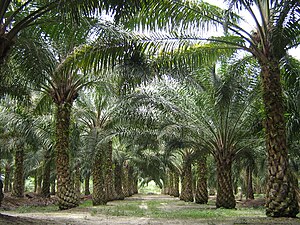Palm oil production in Malaysia
[5] In the early 1960s, palm oil cultivation increased significantly under the government diversification program to reduce Malaysia's dependency on rubber and tin.
[6] The FELDA land settlement schemes were introduced surrounding most of the palm oil plantation fields to eradicate poverty among the local people.
[7] In March 2019, the European Commission concluded that palm oil cultivation results in excessive deforestation and its use in transport fuel should be phased out by 2030.
[8] India, the world's biggest buyer of edible, effectively banned imports of refined palm oil from Malaysia.
This move came after New Delhi objected to Malaysian PM Mahathir's criticism of India's new citizenship law of 2019, which is perceived to be targeting Muslims.
[13] Malaysia's Sime Darby is the largest listed palm oil company globally, based on plantation area and fresh fruit bunch production.
[15][16] The world's second-largest oil palm plantation company, Felda Global Ventures Holdings (FGV), is also based in Malaysia.
[21] The Malaysian government also established Kolej Serdang, which became the Universiti Putra Malaysia (UPM) in the 1970s to train agricultural and agroindustrial engineers and agribusiness graduates to conduct research in the field.

